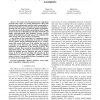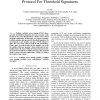76 search results - page 7 / 16 » Confirmer Signature Schemes Secure against Adaptive Adversar... |
103
click to vote
ATC
2007
Springer
15 years 8 months ago
2007
Springer
A proxy signature scheme allows an entity to delegate its signing capability to another entity (proxy) in such a way that the proxy can sign messages on behalf of the delegator. Pr...
120
click to vote
FOCS
2010
IEEE
14 years 11 months ago
2010
IEEE
We construct the first general secure computation protocols that require no trusted infrastructure other than authenticated communication, and that satisfy a meaningful notion of s...
91
Voted
JCM
2008
15 years 1 months ago
2008
Publicly verifiable secret sharing (PVSS) allows not only shareholders themselves but also everyone verify the shares of a secret distributed by a dealer. It has a lot of electroni...
112
click to vote
TCC
2005
Springer
15 years 7 months ago
2005
Springer
Adaptively-secure encryption schemes ensure secrecy even in the presence of an adversary who can corrupt parties in an adaptive manner based on public keys, ciphertexts, and secret...
113
click to vote
PKC
1999
Springer
15 years 6 months ago
1999
Springer
This paper presents a simple and efficient conversion from a semantically secure public-key encryption scheme against passive adversaries to a non-malleable (or semantically secure...


